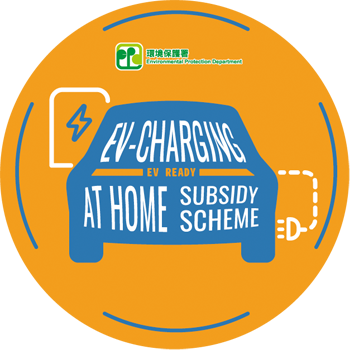The EV-charging at Home Subsidy Scheme
Electric vehicles ("EVs") have no tailpipe emissions. Replacing conventional vehicles with EVs can help improve roadside air quality and reduce greenhouse gas emissions. In view of the rapid development of EV technology, electric private cars ("e-PCs") may become the main stream vehicles in the foreseeable future. To support the wider use of e-PCs, the Government has been sparing no efforts in enhancing the EV charging infrastructure and network.
The Government has rolled out a $3.5 billion "EV-charging at Home Subsidy Scheme" ("EHSS") to subsidise the installation of EV charging-enabling infrastructure ("EVCEI") in car parks of existing private residential buildings, and hence further facilitate EV owners to install EV chargers at car parks of their residences according to their own needs in the future in a simple and easy manner. The EHSS is expected to cover about 140,000 private parking spaces in about 700 car parks of the existing private residential buildings and estates, accounting for about half of the eligible parking spaces in Hong Kong. Processing of applications is on a first-come-first-served basis until the funding is used up.
Key Steps to Participate in the EHSS
- Check if the car park is eligible for the EHSS;
- Check if you belong to either one of the 3 types of applicants for applying for the EHSS;
- Hold meeting of the owners’ corporation or meeting of all owners, as the case may be, to pass resolutions for applying for the EHSS [note: the applicant may choose to pass all the required resolutions listed in Part 1 to 3 of Annex 1 in one single meeting of the owners’ corporation or meeting of all owners before making the application.];
- For applicant of all owners, seek independent legal opinion to confirm and certify that resolutions may be passed at the meetings of the owners and such resolutions shall be binding on all the owners of the building(s) concerned (Submission of Application);
- Seek written advice from the power company for preliminary assessment on the power supply capacity available;
- Submit completed Application Form and required documents to the Environmental Protection Department ("EPD");
- If the application is successful, procure the services of a consultant to prepare the works specifications for the installation of the EV charging-enabling infrastructure (Annex 2), and inform the EPD the name of the consultant selected and the contract sum for the consultant’s service;
- Sign an initial subsidy agreement with the Government (initial subsidy agreement) after signing the contract with the selected consultant;
- Submit the final coverage of parking spaces and the specifications of the installation works of the EVCEI to the EPD for review and confirmation;
- Procure the services of a contractor to carry out the installation works (Annex 2), and inform the EPD the name of the contractor selected and the contract sum to be paid to the contractor for the installation works;
- Sign a further subsidy agreement (further subsidy agreement) with the Government after signing the contract with the selected contractor;
- Monitor the conduct of the installation works and submit bi-monthly progress reports of the installation works to the EPD;
- Open a dedicated bank account or designate a dedicated bank account for the subsidy to be granted under the EHSS;
- Submit claim form with supporting documents to the EPD for release of subsidy;
- Pay the consultant and contractor according to the terms of payment in the relevant contracts;
- Keep books of account for inspection by the EPD; and
- Operate and maintain the EV charging-enabling infrastructure installed.
- Submit regular usage reports to the EPD (Report on Use of the EVCEI installed under the EHSS).



